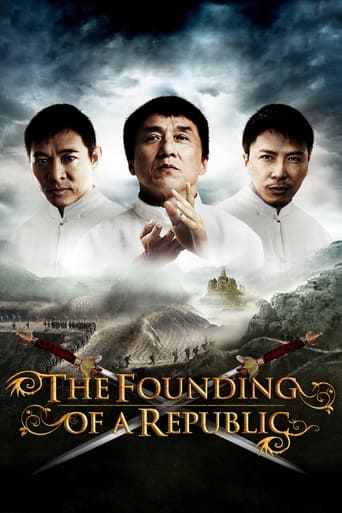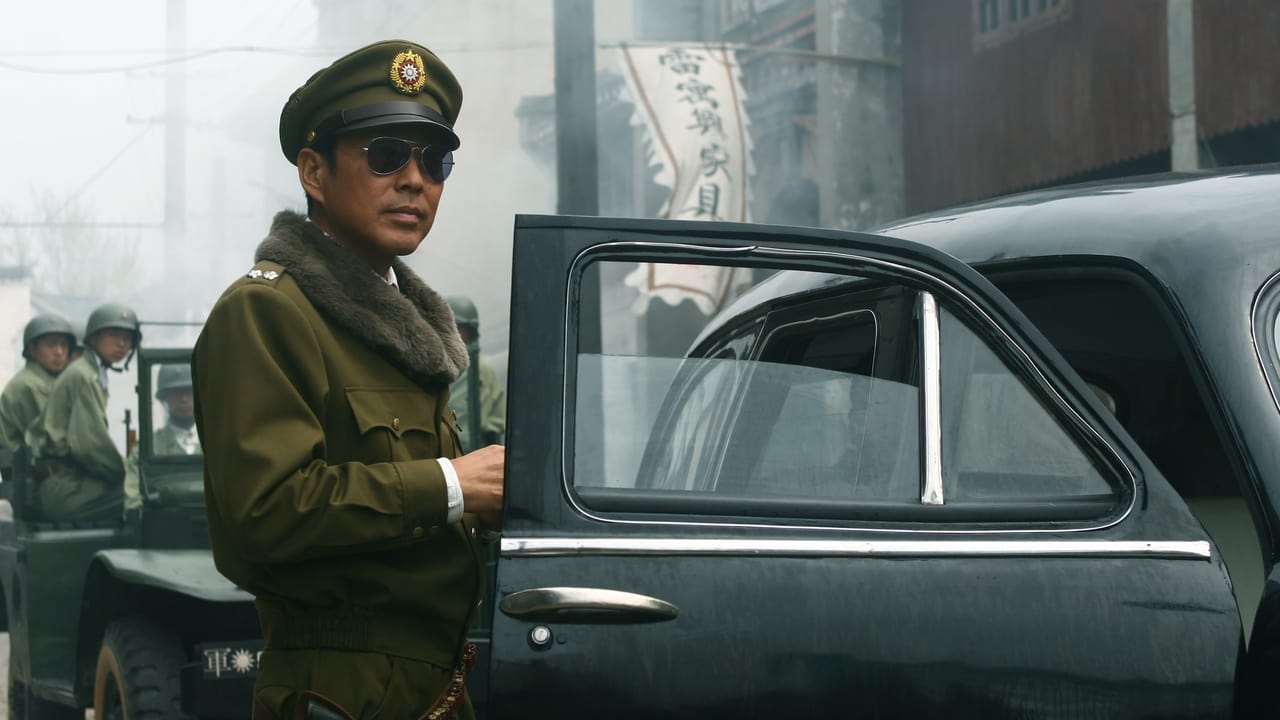Hunky Stud
Currently, every film that is to be made in China has to be approved by the government first. Since this film is about the founding of the PRC, I expected that this film will be full of communist propaganda rhetoric materials. I was surprised that it has very few. It actually has some scenes which can be inferred to the current situation of Chinese communist party. Sundry celebrities appeared in the film, it is almost like watching the CCTV's yearly Chinese new year show.It seemed that it showed the history correctly without trying to make the Kuomintang people acting like idiots or clowns. Even though many historical people appeared in the film, this film is not hard to follow. I was captivated by it for the entire two hours.
Paul63
The year is 1945. The two leaders of China's civil war meet in Chongching and agree to form a coalition government and prepare for peace and democracy.For reasons that aren't entirely clear, one side - the Nationalists (KMT) under Chiang Kai-Shek - decides it rather prefers to go back to the war, and the Communists (CPC) under Mao defends the future of Chinese democracy.Throughout the film, Mao is a benign presence. He's greatly admired by his followers and considerate even to his cook, mourning him when he's killed. He plays and dances with children. He is stoic in the face of disaster and he remains keen to include other parties (the Chinese Democracy League and even the KMT, although not Chiang) in a coalition government before bringing democratic reform. He takes decisions by reaching a consensus and demonstrates decisive wisdom by implementing land ownership reforms. At one point, and without any sense of irony, Mao says before giving a direct order, "I'll be a dictator for a change". Without any cities in their hands Mao plans a new country: the lack of a city for a capital is phlegmatically described as "inadequate" by the Great Helmsman.Meanwhile, the KMT has problems. The party is split with factions conspiring against Chiang Kai-Shek. Assassinations are organised. Corruption in areas they control is rampant - it's "in the bones" of the KMT, says Chiang, revealingly. There are food shortages and rampant black-marketing. Chiang is apparently another benign presence, but seemingly impotent in the face of such problems. Elsewhere, KMT soldiers and agents kill pro- democracy activists.The rest, as they say, is history.But that's precisely the problem with the film: the history.For overall, the film is a rather pedestrian telling of an alternative version of the founding of the People's Republic of China. Any sense of drama is limp like a balloon deflating, and thus fails. The dialogue is preoccupied with explaining events and giving background rather than (say) developing characters and it feels at times like a dramatised documentary. Indeed, in a couple of places, it even uses archive footage.As we know, though, this isn't just a film: it has (another) Official History to tell and tell it it will, come what may. It is an Orwellian exercise.The revision of Chiang Kai-Shek has been remarked upon above but the point missed. Chiang has been rehabilitated to a certain extent as a great Chinese patriot, although one who is mistaken. A key scene in the film occurs with his son: the KMT are deciding to negotiate with the CPC, and the proposal is that China be divided along the Yangtze River. Chiang himself says that this would be something he would never allow. This is in line with the "one China" ideology espoused by the CPC, and also by today's KMT, even if they can't agree precisely what that China is.We know that Chiang and Mao were both ruthless dictators who both could be personally cruel and who both presided over corrupt regimes. Both before and after 1949, both were responsible for the murder of large numbers of their own citizens, although Mao wins the numbers game if we're counting corpses. We also know that the remarked upon land reforms of Mao - who is officially 30 percent wrong - were a catastrophic failure, while those of Chiang Kai-Shek in the 1950s were in fact a success.Finally, we also know that democracy was never really the intention of either leader. The references to democracy in the film are surely in very poor taste when - as I write this - Liu Xiabo, the winner of the 2010 Nobel Peace, languishes in jail and a number of his peers were earlier killed in the Tiananmen Square massacre of 4 June 1989 for demanding precisely that: democracy in China.
horse_power_9000
This is not a movie as such; but more of a propaganda film from some Chinese government brainwashing program. The films producer, the China Film Group (CFG) is actually a state owned media branch of the Chinese Communist Party (CCP), and are the sole importer/exporter of film in China. 'The Founding of a Republic' has to be the most classic example of communist propaganda to be produced by the CCP. Completely geared at glorifying the communist regime now in control of China, historical fact takes a back seat in this zombifying dissemination which is comparable to such films found in 1930s Germany. In the film the antagonists are the party who governed China during World War 2, the Kuomintang (KMT), while the protagonists are -yup you guessed it- the CCP; and not mention history's biggest mass murderin' glorious leader -Chairman Mao Zedong. And while the KMT ruled brutally, no one was prepared for the bloody reign of terror of Chairman Mao who left a body count greater than that of Hitler's and Stalin's combined. The regime has obviously spared no cost at producing a high quality production, but it can't hide the fact this film is cheesy and over dramatic as it attempts to incite ultra-nationalist sentiment in Chinese viewers. This film glorifies the dictator, it glorifies the regime, it glorifies the party. This government mouthpiece of a movie points the fingers at everyone else's wrongdoings, and condemns them for it, yet refuses to accept responsibility for or even acknowledge the crimes the communist party have committed, and indeed, are still committing. Whenever a film about a political party is made it can't amount to anything but propaganda and you just can't take it seriously. And less so when the direction and dialog is corny and the 'facts' are inaccurate and over-dramatized, and as the 2008 Olympics have taught us the regime in 'The Peoples Republic' are not shy to boast of their glory yet completely ignore their own heinous crimes.
dbborroughs
HUGE retelling of the founding of modern China after the Second World War. Its the story of the battle between Chiang Kai-shek and Mao Zedong for control of the country. Despite some glimpse of battle this is a film that dwells mostly on the politics of the struggle. Its a fast paced tale that moves at a lightning speed through events. The speed is such that the film frequently uses titles to say where we are and who is speaking. Its large scale story that plays out like many of the American war films of the 1960's and 70's like The Longest Day, Tora Tora Tora, Midway (or to take another bend Towering Inferno) which play things out in a semi-documentary style. Like those films its both good and bad since it tells the huge story with a great deal of clarity, but its bad since the film contains a great deal of emotional distance since we're simply watching events not getting to know the characters. Who are all of these people? You really don't know, unless you already know the history. It kind of helps that the cast is full of many of China's biggest stars (Jackie Chan, Ziyi Zhang,Jet Li, Tony Lung Ka Fai, Andy Lau, Stephen Chow, Donnie Yen, Vivian Wu to name a few) but at the same time many of them are reduced to little more than walk ons. I like the film, but in the the way I'd like a documentary on the History Channel with recreations because it showed me some things I didn't know before. But at the same time what it showed me was kind of disconnected to reality and was floating about in space and not likely to stick because unless you know the history already watching the recreation is going to mean little. Can you tell I'm mixed? I liked it, I think its good and I had no problem following what was going on but its too emotionally distant to the point that I don't know if I need to ever see it again. Worth a look if you stumble across it (especially if you're a fan of the multitude of stars) but its not something you need search out. The very definition of a footnote film or the one film that makes playing 6 degrees of Kevin Bacon with Chinese actors so much more simple.


 AD
AD



